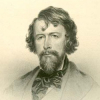Nathaniel Parker Willis

Nathaniel Parker Willis
Nathaniel Parker Willis, also known as N. P. Willis, was an American author, poet and editor who worked with several notable American writers including Edgar Allan Poe and Henry Wadsworth Longfellow. He became the highest-paid magazine writer of his day. For a time, he was the employer of former slave and future writer Harriet Jacobs. His brother was the composer Richard Storrs Willis and his sister Sara wrote under the name Fanny Fern...
NationalityAmerican
ProfessionAuthor
Date of Birth20 January 1806
CountryUnited States of America
The Spring is here--the delicate footed May, With its slight fingers full of leaves and flowers, And with it comes a thirst to be away. In lovelier scenes to pass these sweeter hours.
Spring is a beautiful piece of work; and not to be in the country to see it done is the not realizing what glorious masters we are, and how cheerfully, minutely, and unflaggingly the fair fingers of the season broider the world for us.
The night is made for tenderness,--so still that the low whisper, scarcely audible, is heard like music,--and so deeply pure that the fond thought is chastened as it springs and on the lip made holy.
It is the month of June, The month of leaves and roses, When pleasant sights salute the eyes And pleasant scents the noses.
Press on! for in the grave there is no work and no device. Press on! while yet you may.
At present there is no distinction among the upper ten thousand of the city.
Like Melrose Abbey, large cities should especially be viewed by moonlight.
The rain is playing its soft pleasant tune fitfully on the skylight, and the shade of the fast-flying clouds across my book passed with delicate change.
Maturity is most rapid in the low latitudes, where pineapples and women most do thrive.
Gentleness is the great point to be obtained in the study of manners.
Nature has thrown a veil of modest beauty over maidenhood and moss-roses.
Pitch a lucky man into the Nile, says the Arabian proverb, and he will come up with a fish in his mouth!
We may believe that we shall know each other's forms hereafter; and in the bright fields of the better land call the lost dead to us.
There is no divining-rod whose dip shall tell us at twenty what we shall most relish at thirty.